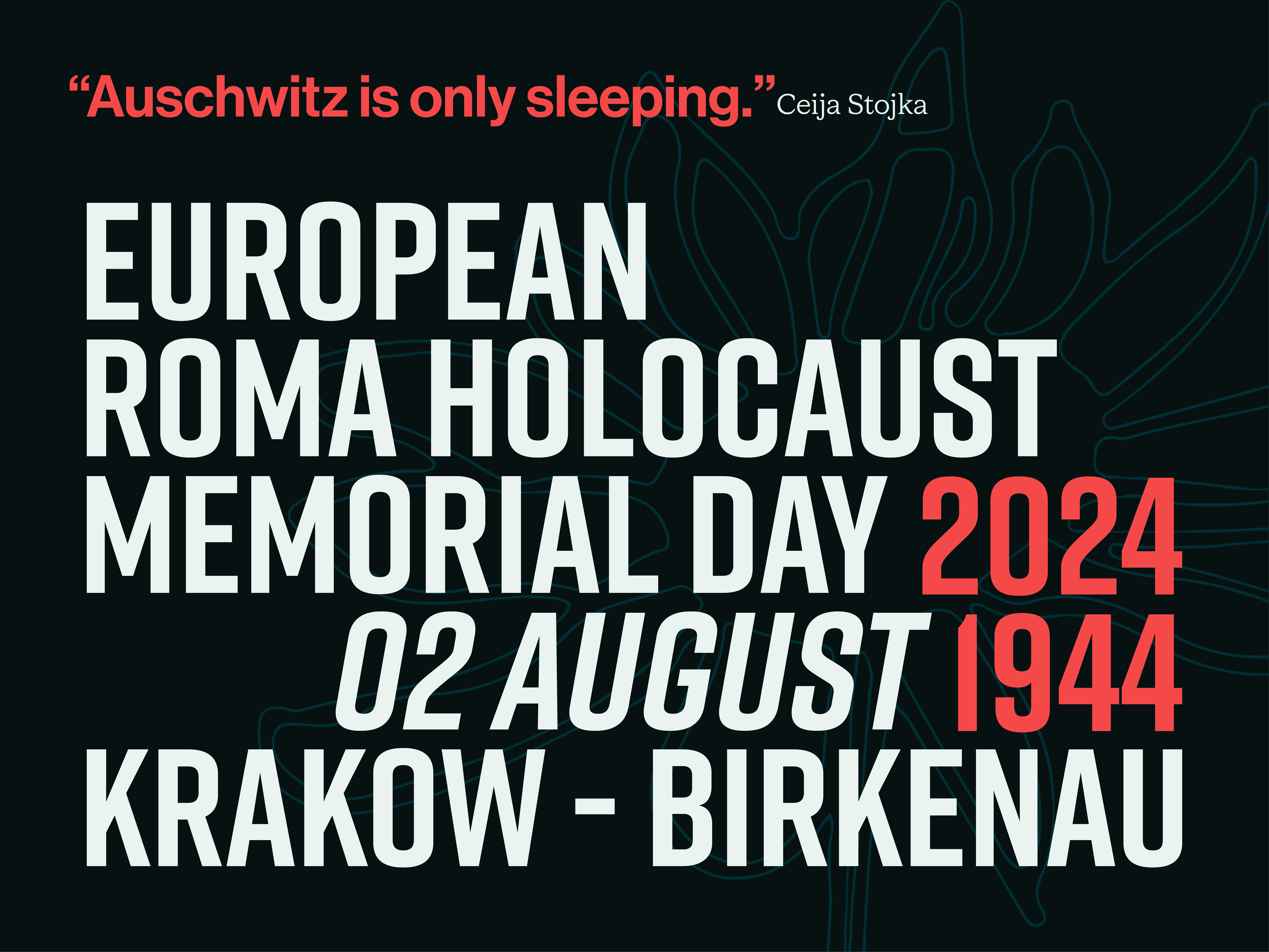
Commemorative ceremony for the 80th anniversary of the liquidation of the "Gypsy Family Camp" at the Auschwitz II-Birkenau Concentration and Extermination Camp
Friday, 2 August marks 80 years since the tragic night in 1944 when the Nazis liquidated the so-called "Gypsy Family Camp" in the Auschwitz II-Birkenau Concentration and Extermination Camp. In the gas chambers of that concentration camp, despite their active resistance, 4,300 Romani people from 14 countries were murdered.
In 2015, the European Parliament declared 2 August European Roma Holocaust Memorial Day to commemorate the 500,000 Roma and Sinti murdered in Nazi-occupied Europe. This year’s memorial event culminates on Friday, 2 August with the traditional commemorative ceremony at Auschwitz, which will be broadcast at noon by news server Romea.cz.
Almost 90% of the Roma from Bohemia and Moravia were murdered by Nazi Germany’s genocidal machinery during the Second World War. Of the approximately 6,500 Romani people in the Protectorate of Bohemia and Moravia, 4,870 were forcibly transported to the Auschwitz Extermination Camp, of whom just 583 returned from there to a reconstituted Czechoslovakia after the war.
The so-called “Gypsy Family Camp – B II e” at Auschwitz II-Birkenau comprised 32 wooden buildings in a space that was 150 x 170 meters square. As many as 1,200 people were crowded into buildings designed to house 300-400 people.
Unlike other concentration camps, the Roma there were not assigned to work details outside the camp and the families lived together, just as they did in the Jewish Family Camp. More than 20,000 persons were listed in the so-called “Gypsy Family Camp”; in addition to Bohemian and Moravian Roma they were predominantly Austrian, German and Polish Roma, as well as smaller groups of Roma from Belgium, France, the Netherlands and other countries.
There are many side events organized this year by the Roma Foundation for Europe and its network of NGOs such as the European Roma Institute for Arts and Culture (ERIAC), the Roma Education Fund (REF), the Roma Entrepreneurship Development Initiative (REDI) and Roma for Democracy (RFD). Their aim is to repeatedly make visible the stories of Romani victims of the Holocaust, to educate the younger generation about its horrors, and to ensure the Roma are not the forgotten victims of this tragedy.
On Thursday, 1 August, the commemoration was launched with the exhibition “Romani Heroes of the Resistance”, artworks by Emanuel Barica, at the Auditorium Maximum in Krakow, Poland. The opening was followed by a conference called “My Testimony is for Young People” and a memorial concert performing the oratorio “O Lungo Drom“.
“Artists and creatives are of essential importance to preserving the memory of the Holocaust of the Roma and transmitting it to others,” Timea Junghaus, Executive Director of ERIAC, said of the events being held on the occasion of European Roma Holocaust Memorial Day in Poland. At a time when anti-Romani sentiment is on the rise, she believes being confronted with this history and supporting education about it is key.
“Art heals, and Romani creative talents play a crucial role in that process,” Junghaus said. The president of the Roma Foundation for Europe, Željko Jovanović, emphasized the difficult, long process of building the memory of the horrors perpetrated against Romani and Sinti prisoners in Auschwitz during the Holocaust.
“We have been putting together the memory of the atrocities committed against our ancestors in Auschwitz for a long time, and the recognition of them has taken just as long,” Jovanović said. In his view, it remains essential that public officials overcome their short-term electoral calculations and adopt measures to build memorials, include this subject in public education, and publish truthful information about the genocide of the Roma through the media.
“Such measures would aid us with freeing ourselves from the prison of past and present racism,” Jovanović said. He also expressed his concerns regarding the current political situation in Europe.
“What can we expect from public institutions and bureaucrats when our parliaments and our governments are infested with ultra-right, extremist politics? Europe does indeed remember, and we can expect protection from this,” Jovanović said, appealing to Romani people’s moral responsibility to transform the memory of the Holocaust into a resource for purposefulness and self-assertion: “It is our moral responsibility, as Romani people, to create unity across our national affiliations, languages and religions, to ensure that our message will be heard and our demands will be taken seriously,”
During the 17 months of the existence of the so-called “Gypsy Family Camp” (from February 1943 to July 1944) as many as 23,000 children, men and women were imprisoned there. Approximately 21,000 Romani and Sinti prisoners perished in the camp.
Other Romani prisoners were murdered in the concentration camps of Bełżec, Chełmno, Majdanek, Sobibór and Treblinka. Others, whose numbers are difficult to estimate, were shot and buried in mass graves in forests.
The extermination policy of Nazi Germany led to the death of an estimated half a million Roma and Sinti from all over Europe. Some estimates range as high as 800,000 victims, equivalent to between 25-50 % of the interwar population of Romani people in Europe.
- Zdeněk Ryšavý & Gwendolyn Albert
This article was originally published by Romea.

Roma Foundation for Europe
The latest

Serbia Must Amend Missing Persons Alert System to Protect Vulnerable Adults

Constitutional Review of the Šutar Law Confirms Serious Rule-of-Law Concerns

Europe’s Growth Depends on Roma Talent
Browse by category
Campaigns
Events
Facts
Press
Voices
For media inquiries:
[email protected]Sign up here so you don’t miss out on campaign updates, upcoming events and other news from the Roma Foundation for Europe and our network.
Sign up for our newsletter